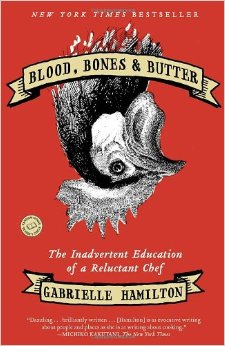Well, I was, anyway.
Some context, in two parts: First, What I’m Reading posts are meant to give writers who are considering submitting to EB a sense of what I like and why, and to give people interested in the press in general a sense of who I am as a reader. I have been terribly negligent of this forum in general and this feature in particular, and I’m going to try to do better. Second, I have a general rule in the world that I do not slag on books in public. There are occasions on which I will break that rule: when the book is so popular and also so bad that I actually begin to think I must’ve read a different book (ahem, Time Traveller’s Wife); when the book or its author is so deeply offensive that I feel it’s worthwhile to say something (oh, hi, Tucker Max); or when the book or author is mean-spirited enough that I feel the bounds of civility are strained.
Blood, Bones & Butter by Gabrielle Hamilton earns the third category of exception.
As basically everyone has noted, the writing here, on a sentence level, is mostly really good and is exceptional for someone whose main daily practice is not writing. Our relationships with language are fluid and require daily attention, and without that daily attention, our diction and syntax are not, generally, as elegant and revealing as Hamilton’s. And the description of her parents’ lamb roast party drew me right in, partly because it strikes the perfect note of nostalgia and partly because it reminds me of the harvest season hog roasts we attended every year at the farm where my father worked until I was six.
But so much of this book is about Hamilton’s disdain for other people that I’m putting it down.
My reading experience survived some obvious factual inaccuracies that drove me nuts (claiming she listened to Guns N’ Roses in a diner kitchen in 1983-84, for example) and some further strained credibility about her general badassery. But I cannot continue to subject myself to pointless mean-spiritedness.
Listen, if you want to grow up in rural Pennsylvania then cherish your “East Coast sensibility” to the point of fetishization, be my guest. But to spend pages on end characterizing the Midwest and Midwesterners as bland and uninteresting based on your tiny little experience in the University of Michigan MFA program, you’re a sloppy thinker.
The stopping point, for me, though? Two full pages making fun of a classmate for engaging in the ever-dreaded poet-voice reading cadence at an end-of-semester class reading, with enough identifying detail that everyone who was present at the event can easily know who’s being skewered. Up to this point in the book, when Hamilton makes fun of a person mercilessly, she usually ends up describing becoming friends with them later. (One exception is her mother, who she treats pretty terribly in this narrative without ever explaining what she’s done wrong—perhaps they make peace later in the narrative, but I won’t find out, because I’m done.) But not this poet. This scene, and much of the writing about her MFA experience, is about her disdain for these poor stupid self-important saps who don’t live in the real world where people cook all day. (Also a paragraph that is just blisteringly mean to Nicholoas Delbanco, who is easily identified here.) And I’ll just say now: Fuck that attitude.
Every MFA program, like every anything has some entitled assholes enrolled. And also some sincere people who’ve worked their asses off for the opportunity to be made fun of in a NYT Bestseller by a privileged, entitled, whiny brat who thinks she’s better than they are because…well, I can’t tell why we’re supposed to buy into her disdain. She’s a person who makes stuff for a living, just like they are.
For me, reading is about connection, about empathy and humanity. This book, despite all its fascinating food-related elements, is about placing its author in a superior position to other people. She’s welcome to do that in her kitchen, where hierarchies have meaningful functions, but in her writing, it does neither writer nor reader any favors.

